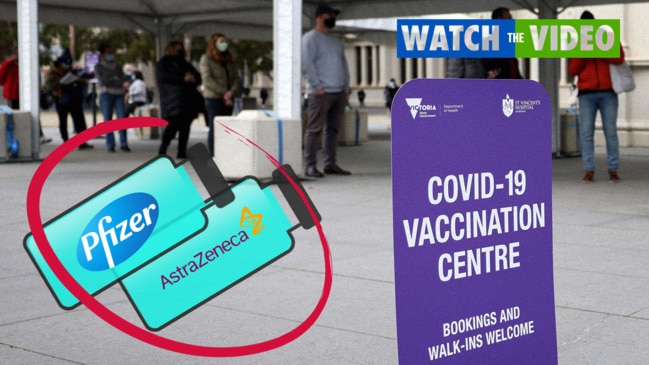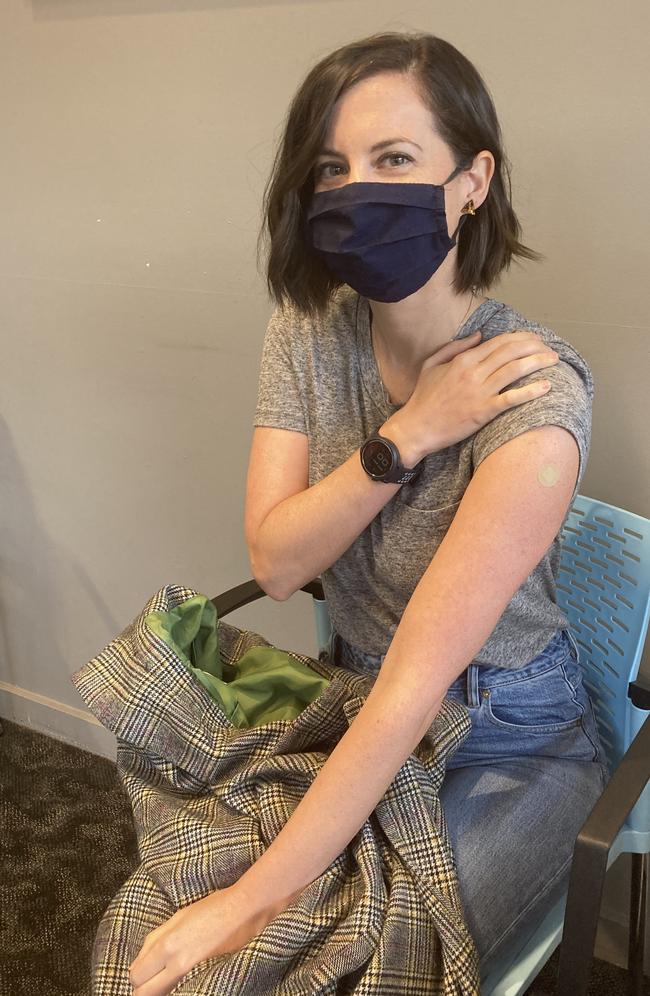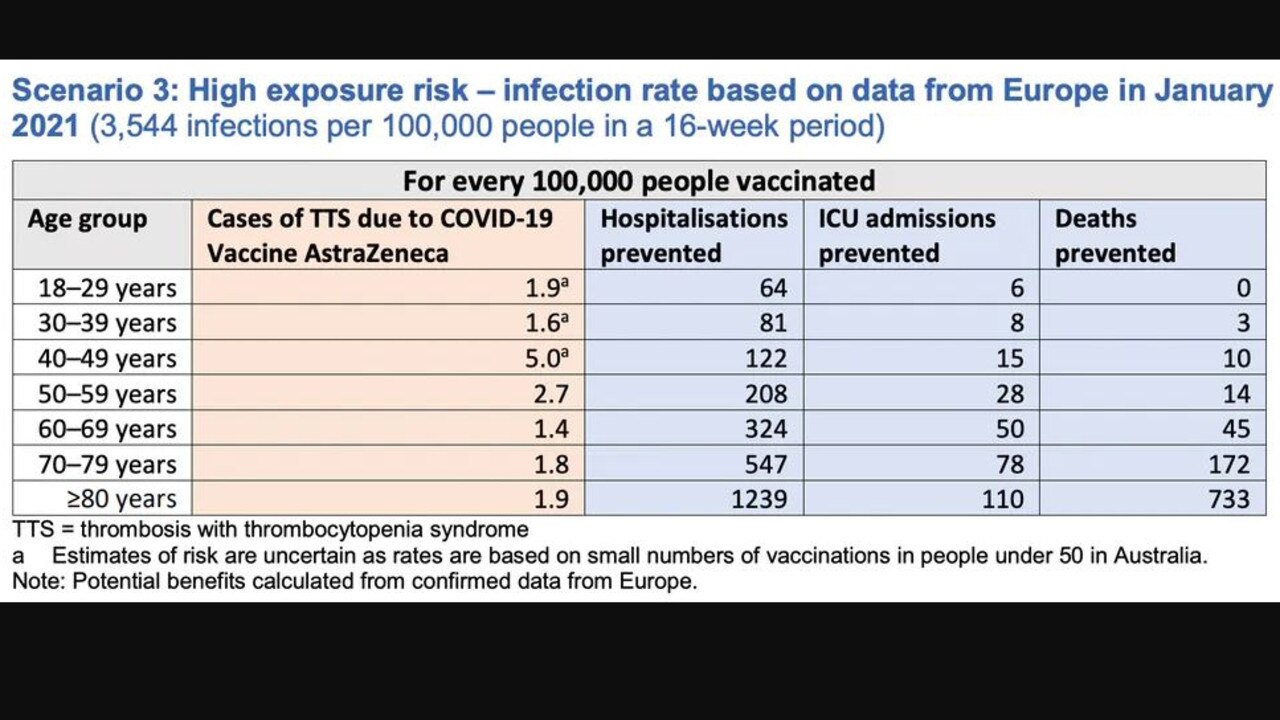Choice to get AstraZeneca has helped me get through Sydney lockdown
They’ve been offered a way out of the pandemic but there’s a reason this particular demographic are reluctant to get vaccinated.

OPINION
Through AstraZeneca, young people in Australia have been offered a path out of the pandemic.
The problem is, the messaging around this path has been so confusing and muddled most people don’t know whether taking it is the right thing to do or just plain stupid.
On June 28, Prime Minister Scott Morrison announced under 40s could have AstraZeneca if they “go and have that discussion” with their GP. So far, over 8000 young people have opted for this.
For me, the choice to have AstraZeneca (AZ) gave me the only bit of control I’ve had since the pandemic began and international borders closed. Getting it has offered me a bit of hope during lockdown in Sydney.
While there is a small risk of developing a blood clotting condition, right now it’s a risk I – and many other under 40s – are willing to take. We want to get some semblance of normality back. We want international borders to open and we don’t want any more hard lockdowns.
With most of my family overseas, it’s been 496 days since I saw my parents and 810 days since I saw my brother. I have no idea when I’ll see them again and enough is enough.
Vaccinating against Covid-19 is the only way for Australians to get their normal lives back, but as a nation we’re struggling.
News.com.au’s Our Best Shot campaign answers your questions about the Covid-19 vaccine roll out.
It’s fair to say the vaccine rollout has confused Australians. We’ll cut through the spin and give you clear information so you can make an informed decision.
RELATED: Aussies ignoring advice to get AZ vaccine

What are the risks versus benefits?
While I’ve decided to get AZ, it’s not what all health professionals are advising. When Mr Morrison offered the vaccine to under 40s it took the Australian Medical Association by surprise and the president of the Australian Medical Association said: “Our recommendation is still really for patients to follow the ATAGI advice”.
The Australian Technical Advisory Group on Immunisation (ATAGI) advice is that Pfizer is the preference for those under the age of 60 years.
Dr Brett Montgomery, GP and senior lecturer at The University of Western Australia, said he felt “divided on an ethical front” about recommending AZ to people under 40. At this time the benefits of AZ don’t outweigh the risks for people in that age group.
“When I talk to people about the risk of the vaccine and possible benefits in people over the age of 60 it’s easier to feel confident,” Dr Montgomery said.
“The younger people get the harder it is to feel on balance that you will have more benefits than harm from the AstraZeneca vaccine.”
RELATED: ‘Selfish’ Millennials step up to save Aus
In my age bracket (30-39 years), the risk of getting the rare blood clotting disorder thrombosis with thrombocytopenia syndrome (TTS) is approximately 1.6 in every 100,000 people.
The risk of dying from TTS after having the vaccine in Australia is 0.5 in one million or one in two million, although the risk is higher for younger people — around one in one million. Fundamentally, my risk of dying after AZ is incredibly low compared to other activities.
RELATED: Risks under 40s are taking with AZ jab
As Dr Montgomery says, what is being weighed up here is the “small risk of the clotting condition and the small risk of coming to harm from covid”.
Odds are, at my age I’m not going to be harmed by either. But what is harming me is the fact that my life is on pause and I can’t see people I love.
The delta variant
What has made Australia’s vaccine roll out more urgent is that the highly infectious delta strain is now out in the community, especially in NSW.
The risks versus reward in the first table is based on the assumption that cases stay at a “low exposure risk” similar to Australia’s first wave. The more cases go up, the more the benefits of AZ are felt.
“At the moment covid case levels are very low in the community. The advice from ATAGI that young people should wait does rely on the assumption that we will keep cases at low levels in Australia which we have been managing to do for over a year,” Dr Montgomery said.
“The delta variant makes the estimation of risk and benefits harder. We’ve done great keeping covid at bay so far, especially in Victoria last year, but I’m not so convinced it will be the same with the delta variant in Sydney … it’s hard to predict that future. And who knows what the next variant will be.”
Where I am in NSW, it feels like we are back to square one. I’m fearful that cases of the delta variant of covid could escalate if more people aren’t vaccinated. If you look at the risk of AstraZeneca versus benefits when exposure to covid is high, the benefits rise exponentially for all age groups.

Months of waiting
A very valid argument I’ve heard about younger people not getting AZ is that the 12-week wait between jabs means that by the time I have my second jab (booked in for October 2) there should be access to Pfizer anyway. With Pfizer only needing three weeks between jabs, it could be hardly any time difference at all.
Australia is relying on a boost in Pfizer vaccines to get the vaccine program complete and our borders opened. We are due 36.2 million doses from August to December but at the moment they are being drip fed through – with only 300,000 arriving this week.
I don’t have confidence in the Federal Government that there will be enough doses in Australia for me – a low risk, young(ish) person – to be eligible for Pfizer by October and Dr Montgomery agrees.
“We are told October but it would be naive to think that everyone that wants it will get it in October. I’m finding it hard to estimate how long that wait would be,” he said.
“On the assumption that the covid-free state continues it’s marginally safer to wait for Pfizer … that’s for young people, not older people.”
For me, the prospect of going into 2022 – two years since the pandemic began – without being vaccinated is not something I’m willing to face.
Herd immunity
One of the biggest benefits of getting vaccinated sooner rather than later is that Australia can build up herd immunity quickly and resume a more normal life.
One dose of AstraZeneca is up to 70 per cent effective at preventing symptomatic covid for the alpha variant and up to 90 per cent one you’ve had two doses. A UK study found that one dose of Pfizer or AZ cut spread of symptomatic Covid-19 within a household by up to 50 per cent.
For the delta variant it’s not such great news. One dose of AZ is 33 per cent effective and two doses offers 60 per cent protection. This compares to 88 per cent for Pfizer. But Pfizer isn’t available to me at the moment and covid is in my community.
Even if a vaccinated person does catch covid, both Pfizer and AstraZeneca are very effective at preventing disease, hospitalisation and death from covid. It’s even been found that mixing AstraZeneca and Pfizer has good results, although the studies aren’t conclusive.
It’s completely understandable if people under 40 want to wait for Pfizer or Moderna but the Federal Government needs to make sure the roll out is organised and swift – they need to understand this is now a race. People have sacrificed so much and we deserve a crack at getting our lives back.
I’ve seen through my friends and family what a transformation the UK has been through since they enthusiastically took up their vaccine program. They’ve gone from one of the longest, hardest winters of their lives to celebrating England’s football success by hugging in sunny beer gardens.
Whether it’s Pfizer or AZ, getting vaccinated is Australia’s only option to get out of this mess.
Riah Matthews is the commissioning editor for news.com.au.




